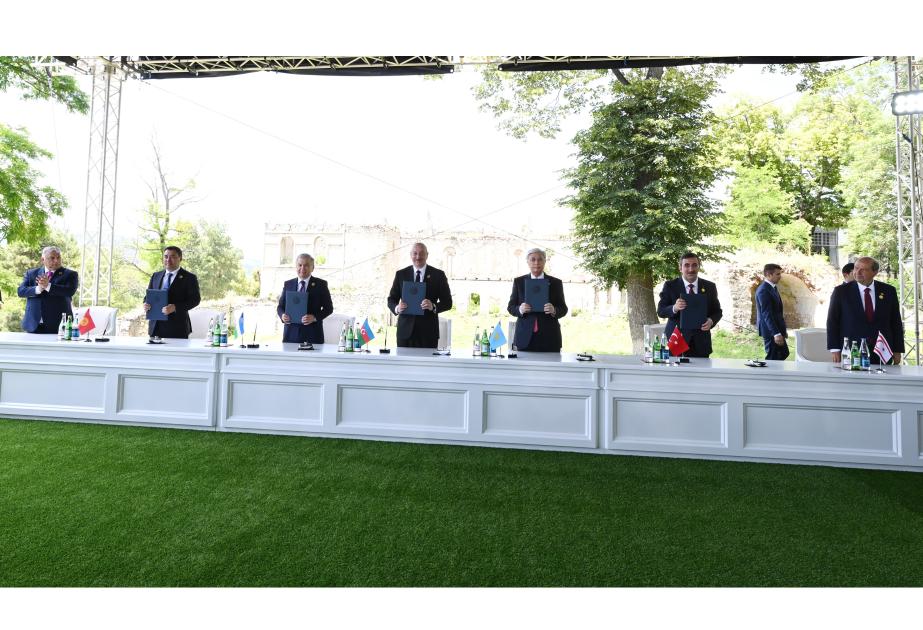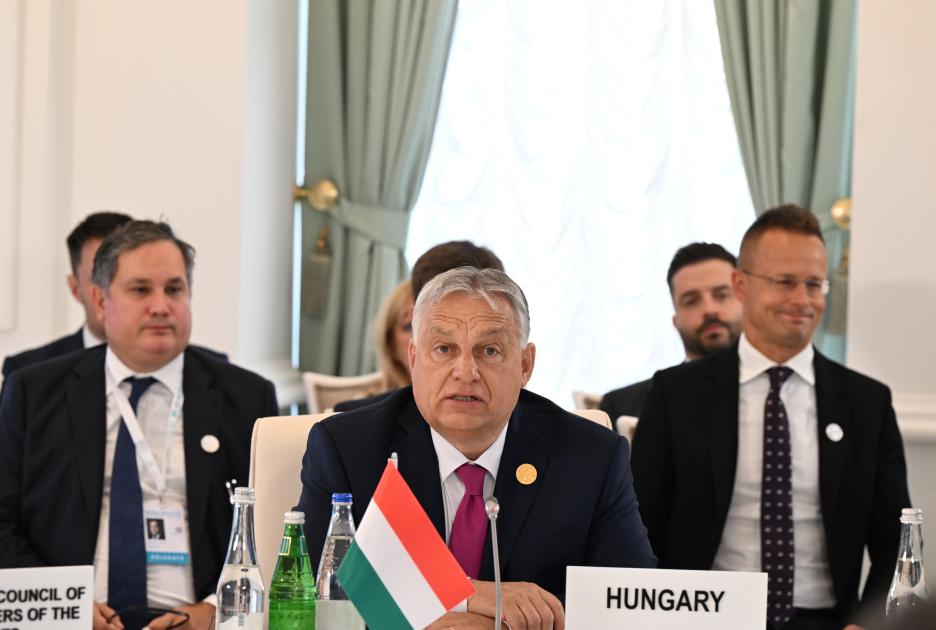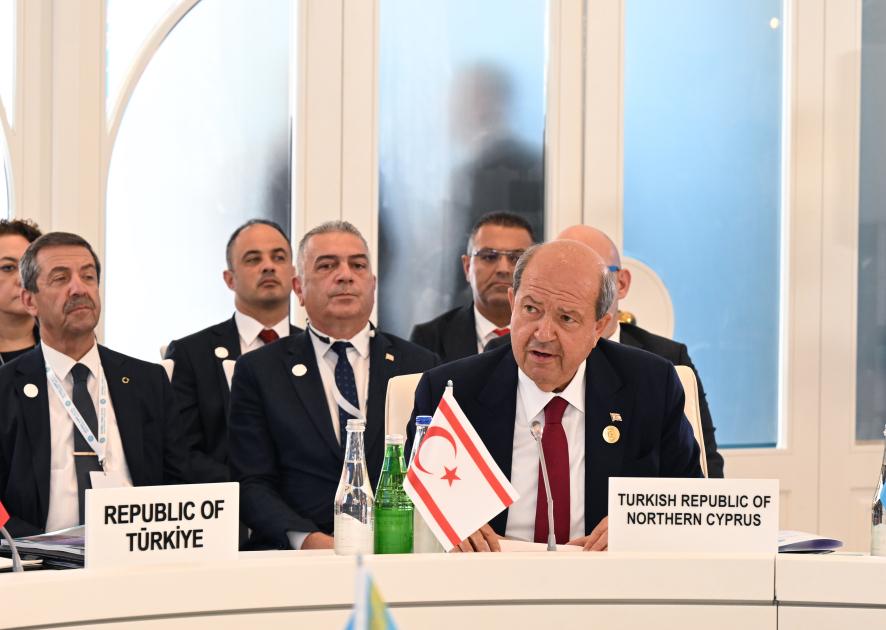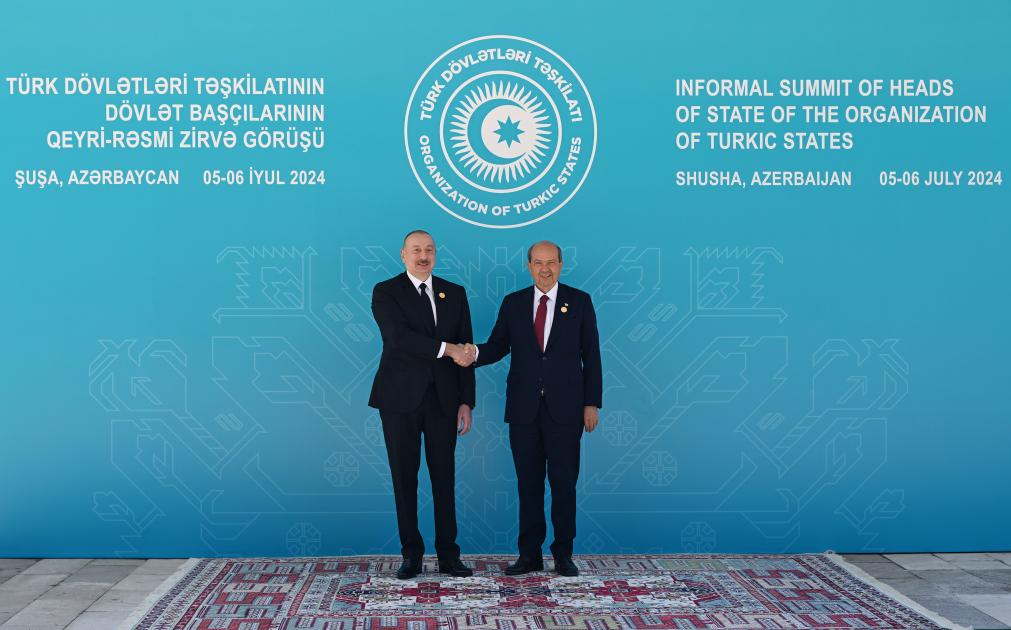Borrell raps Orbán & TRNC president's attendance at OTS event amid Cyprus-Greece pressure Thorn in Borrell’s side
The recent insulting and naive remarks by Josep Borrell, High Representative of the European Union for Foreign Affairs and Security Policy, criticizing Hungarian Prime Minister Viktor Orbán’s participation in the non-formal summit of Organization of Turkic States (OTS) in Shusha, Azerbaijan, have underscored a significant rift in European diplomacy. Borrell’s assertion that Orbán lacked a mandate from the EU to represent the bloc at the summit has reignited debates over the autonomy of member states within the EU’s foreign policy framework.
Context and background
Josep Borrell, notorious for his forthright commentaries on international affairs, serves as the face of EU diplomacy on the global stage. His role involves coordinating the EU’s external actions and policies, maintaining unity among member states on foreign affairs, and representing the EU in diplomatic engagements worldwide. This includes navigating sensitive issues such as relations with Russia and the complex dynamics in the Caucasus region.
Viktor Orbán, Hungary’s long-standing prime minister, has been a controversial figure within the EU. His governance has been marked by policies often at odds with mainstream EU principles, leading to periodic tensions between Budapest and Brussels. Orbán’s visits to Moscow and participation in regional summits like OTS reflect Hungary’s broader strategy to pursue bilateral relations beyond traditional EU frameworks, often aligning closely with his vision of Hungary’s national interests.
The informal Shusha Summit & its implications
The informal OTS summit held in Shusha, a city with significant cultural and strategic importance for Azerbaijan and the Turkic world, gathered leaders from Turkic-speaking countries including Türkiye, Kazakhstan, Kyrgyzstan, and Uzbekistan on July 6, 2024.

For Hungary, attending as an observer state, represented a strategic outreach to bolster ties with these nations, emphasizing cultural, economic, and geopolitical cooperation. The maverick prime minister’s presence at the summit was not merely symbolic but part of Hungary’s broader geopolitical maneuvering, which includes fostering closer relations with states outside the traditional EU sphere. This strategic alignment challenges the EU’s conventional approach to foreign policy, which prioritizes collective decision-making and consensus-building among member states.
Borrell’s diplomatic intervention
Josep Borrell’s statement following Orbán’s participation in the informal OTS summit highlighted the EU’s concern over member states’ independent diplomatic initiatives potentially undermining EU unity and foreign policy coherence. By emphasizing that Orbán did not represent the EU, Borrell aimed to clarify the distinction between national and EU-level diplomacy, asserting the EU’s authority in setting collective policy directions.
The timing of Borrell’s remarks, coming on the heels of Orbán’s visit to Moscow, added a layer of complexity to EU-Hungary relations, particularly amid ongoing tensions over Russia’s role in regional conflicts and energy security. The EU’s stance on Russia, including sanctions and diplomatic isolation in response to Russia’s actions in Ukraine and elsewhere, contrasts with Hungary’s pursuit of bilateral engagements that may be perceived as divergent from EU consensus.
The controversy sparked by Borrell’s intervention underscores deeper fissures within the EU regarding the balance between national sovereignty and collective decision-making in foreign affairs. Hungary’s presidency of the EU Council, coinciding with Orbán’s diplomatic engagements, has heightened scrutiny over Budapest’s adherence to “EU policies and values, especially concerning human rights, rule of law, and democratic norms”.
Orbán’s dismissive response to Borrell’s criticism as “Brusselian bureaucratic nonsense” reflects longstanding frustrations within Hungary over perceived EU overreach and attempts to dictate internal policies. The Hungarian prime minister’s political rhetoric often resonates with segments of the Hungarian electorate that value national sovereignty and resist what they view as external interference in domestic affairs.

Beyond the EU’s internal dynamics, Borrell’s remarks and Orbán’s diplomatic moves carry broader geopolitical implications. Hungary’s strategic alignment with Turkic states and Russia, alongside its EU membership, illustrates the complexities of European geopolitics and the challenge of maintaining unity amidst divergent national interests.
The latest developments once again indicate Josep Borrell has once again found himself at the center of a scandal. The head of EU diplomacy made a pointed statement that Hungarian Prime Minister Viktor Orbán 'did not receive a mandate from the EU Council to represent the EU at the informal OTS summit.'
Additionally, the 'grandfather of European diplomacy' took issue with the participation of Ersin Tatar, president of the Turkish Republic of Northern Cyprus (TRNC), who attended the meeting as an observer.
Borrell 'made it clear': while Hungary currently holds the rotating EU presidency, Orbán did not represent the EU during his visit to Shusha. As previously, Borrell’s futile efforts were as useless as a dog barking at a knot.
Hungary is not the first country to hold the EU presidency. Historically, presidents and prime ministers from countries holding the presidency have continued to make bilateral visits, including to non-EU member states. Never before have European officials been so dismissive of these visits.
Borrell’s blatant racism
One can understand why Borrell emphasized that Orbán did not represent the EU during his visit to Moscow. The EU has sanctions against Russia. What about Shusha?
There are no sanctions against the OTS member states. Azerbaijan has an established partnership with the EU and a bilateral strategic partnership agreement with more than a dozen EU member states. So, why is Borrell so hysterical?
First and foremost, this hysteria reveals the blatant racism, Turkophobia, and Islamophobia that are gaining dangerous strength in Europe. One invites obvious neo-Nazis to the government, another toughens the 'rules of life' for migrants at their dictation, others pick on the Grey Wolf gesture shown by a Turkish footballer on the pitch, and others throw a tantrum: how dare the Hungarian prime minister attend the Turkic summit in Shusha?

In reality, the head of European diplomacy should be advised to take some sedative pills and pay attention to reality. No matter what hysterics are being thrown in European offices, the growing solidarity of Turkic states and the strengthening of partnership within the OTS is a fait accompli with its own geopolitical dimension.
While Europe arrogantly watched Türkiye, the Turkic world has become an important factor not only in regional politics. Yes, Greece and Cyprus are seriously fueling anti-Turkish hysteria in Europe, but is that a reason to ignore the realities? It is better to remember the old saying: 'A dog barks and the caravan moves on.'
No diplomatic hysterics can affect the process of strengthening the partnership of Turkic states and the growth of their influence in the world. Europe should take an example from Hungary and intensify its work in a promising direction. Instead, if Euro-diplomacy is throwing tantrums, it shows how influential people with the mindset of the crusaders and chauvinists are in the offices and corridors of European institutions, especially in the Department of External Relations of the European Union.

For example, there is such a character as Michael Siebert, on whom, if not a 'test', there is nowhere to put neo-Nazi symbols.
It is not excluded that against the background of 'hugging' with Armenia, Borrell was not satisfied with the fact that the summit of OTS was held in Shusha. But if so, it turns out that this European official is questioning the territorial integrity of Azerbaijan. It was necessary to try hard to lower European mediation, which Brussels still hopes for, after the meeting in Prague, where documents on the recognition of the territorial integrity of Azerbaijan were signed. It is understandable when Pashinyan forgets about his signature, but when Borrell does the same?
Finally, there is another side of the issue. In the Brussels offices and corridors, it is fashionable to talk about the 'European family,' but in the EU, there has always existed a kind of 'political hazing'.
‘Old Europe' could not imagine that the Eastern European states, having joined the European Union, would pursue an independent policy and not simply follow the gestures of Berlin and Paris.
Consider 2003, when French President Chirac and German Chancellor Schroeder actively engaged with Moscow, opposed the American military operation in Iraq, and were quite annoyed that Eastern Europe supported Washington. Chirac even irritably remarked that the Eastern Europeans had 'missed a good opportunity to keep silent,' which caused understandable outrage. Today, Hungary's prime minister cannot be forgiven for closer relations with Russia and membership in the OTS.
Most importantly, they cannot 'swallow' that Orbán pursues an independent policy and allows himself to criticize the Brussels bureaucracy for 'crusader thinking' and the perception of the world as a 'colony of white masters,' i.e., the same 'old Europe'.
So, the Euro-bureaucrats, including Borrell, need not only sedative pills but also 'pills against fascism.' This is a very painful matter, but it seems that Europe cannot do without such 'pills'.
Conclusion
Borrell’s intervention regarding the Hungarian prime minister’s participation in the OTS summit serves as a reminder of the complexities of balancing national autonomy with EU solidarity. As Hungary continues to navigate its role within the EU presidency and its broader international engagements, the EU faces critical decisions on how to reconcile competing interests and maintain its role as a cohesive actor in global affairs.








